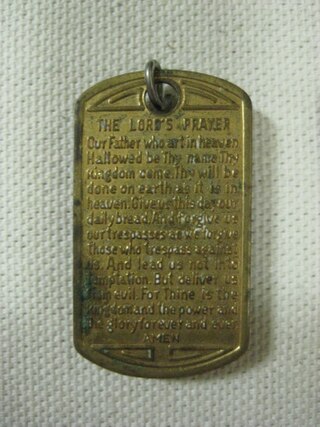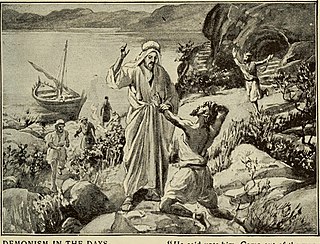
Matthew 6:12 is the twelfth verse of the sixth chapter of the Gospel of Matthew in the New Testament and is part of the Sermon on the Mount. This verse is the fourth one of the Lord's Prayer, one of the best known parts of the entire New Testament. This verse contains the fifth petition to God.

The Parable of the Unforgiving Servant is a parable of Jesus which appears in the Gospel of Matthew. According to Matthew 18:21–35 it is important to forgive others as we are forgiven by God, as illustrated by the negative example of the unforgiving servant.

The Parable of the Two Debtors is a parable of Jesus. It appears in Luke 7:36–7:50, where Jesus uses the parable to explain that the woman who has anointed him loves him more than his host, because she has been forgiven of greater sins.

The Parable of the Rich Fool is a parable of Jesus which appears in the Gospel of Luke. It depicts the futility of the belief that wealth can secure prosperity or a good life.

Matthew 9:2 is the second verse in the ninth chapter of the Gospel of Matthew in the New Testament.

Matthew 9:3 is a verse in the ninth chapter of the Gospel of Matthew in the New Testament.

Matthew 9:4 is a verse in the ninth chapter of the Gospel of Matthew in the New Testament.

Matthew 9:6 is the sixth verse in the ninth chapter of the Gospel of Matthew in the New Testament.

Matthew 9:7 is the seventh verse in the ninth chapter of the Gospel of Matthew in the New Testament.
Matthew 9:11 is a verse in the ninth chapter of the Gospel of Matthew in the New Testament.
Matthew 12:46 is the 46th verse in the twelfth chapter of the Gospel of Matthew in the New Testament.
Matthew 11:24 is the 24th verse in the eleventh chapter of the Gospel of Matthew in the New Testament.
Matthew 9:34 is a verse in the ninth chapter of the Gospel of Matthew in the New Testament.

Matthew 12:42 is the 42nd verse in the twelfth chapter of the Gospel of Matthew in the New Testament.

Healing the paralytic at Capernaum is one of the miracles of Jesus in the synoptic Gospels. Jesus was living in Capernaum and teaching the people there, and on one occasion the people gathered in such large numbers that there was no room left inside the house where he was teaching, not even outside the door. Some men came carrying a paralyzed man but could not get inside, so they made an opening in the roof above Jesus and then lowered the man down. When Jesus saw how faithful they had been, he said to the paralyzed man, "Son, your sins are forgiven."

The Calling of Matthew is an episode in the life of Jesus which appears in all three synoptic gospels, Matthew 9:9–13, Mark 2:13–17 and Luke 5:27–28, and relates the initial encounter between Jesus and Matthew, the tax collector who became a disciple.

John 1:48 is a verse in the first chapter of the Gospel of John in the New Testament.
Matthew 12:31-32 are two verses in the twelfth chapter of the Gospel of Matthew in the New Testament.

Matthew 12:43-45 is a passage comprising the 43rd to 45th verses in the twelfth chapter of the Gospel of Matthew in the New Testament.

Matthew 15:3-6 is a set of verses in the fifteenth chapter of the Gospel of Matthew in the New Testament.















